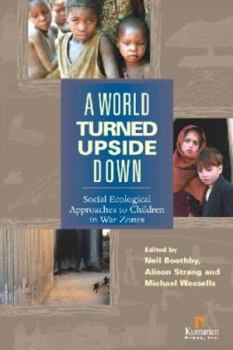A World Turned Upside Down: Social Ecological Approaches to Children in War Zones
The contributors have extensive experience working with children in war zones across the world. The descriptions and dialogue are capable of drawing psychologists, policy makers, anthropologists, and... This description may be from another edition of this product.
Format:Paperback
Language:English
ISBN:1565492250
ISBN13:9781565492257
Release Date:October 2006
Publisher:Kumarian Press
Length:260 Pages
Weight:0.85 lbs.
Dimensions:0.6" x 6.0" x 8.9"
Customer Reviews
1 rating
Revealing the Vulnerability of Children in World Conflict
Published by Thriftbooks.com User , 15 years ago
An excellent series of essays by fieldworkers and program administrators relating to remedial actions towards children caught up in war zones with numerous examples and relevant citations. Areas of conflict discussed include Mozambique, Afghanistan, Sierra Leone, Liberia, Uganda and the Congo, the Palestinian Territories, Israel, Bosnia, Cambodia, Columbia, Ireland, Rwanda, and the Sudan, The spectrum of the causes of trauma is well laid out including voluntary separation (parents sending their children to safety), separation from family, loss of parents to abduction and recruitment of child soldiers. In general most of the examples show remarkable resilience on the part of the children - an improvement in the coverage might have been more cautionary notes, as was sounded in the essay "When Former Child Soldiers Grow Up." One outstanding essay is on the role of family by Alistair Ager and another by Amy Hepburn covers not just conventional families but substitute families such as groups of children bonding together for support and adoptive communities. Susan McKay's essay "Girlhood Stolen" considers the special problems of female children including rape camps, becoming mothers, girls as soldiers and labels of impurity. Neil Boothby's essay (he's one of editors) on the long term impact of being a child soldier reminds us that there are still problems to solve long after the conflict is over and that not only are all victims not mended, some may be the cause of future strife. Michael Wessel's essay "A living wage" points out that reintegration requires that the fhat the child be not only reunited with community, but productively so, and that non victims should not be positioned to be resentful of the special treatment that victims may receive. The essay "Religion as Resource and Risk" started off poorly (IMHO) by beginning to be an academic polemic against religion in general but changed direction to point out the comforting effect of faith and ritual and their necessary role in reintegration of children back into their local communities.. Since World Peace is unlikely to break out soon these problems will be with us for a long time to come. Overall it is a very good collection with many interesting insights. Recommended on its own merits and as a start point for reading on other issues such as the rehabilitation of children during and after war and issues relating to child soldiers. If you want to do something more, consider [...]






